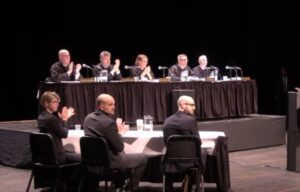Indiana Supreme Court Cell Phone Case
 Katelin Eunjoo Seo v. State of Indiana has raised questions of significant importance to the whole country about privacy rights and the reach of law enforcement. William Webster of Webster & Garino argued before the Indiana Supreme Court in defense of his client’s right to withhold the passcode to her iPhone 7 from criminal investigators. Mr. Webster cited her Constitutional Fifth Amendment right against self-incrimination to justify her silence.
Katelin Eunjoo Seo v. State of Indiana has raised questions of significant importance to the whole country about privacy rights and the reach of law enforcement. William Webster of Webster & Garino argued before the Indiana Supreme Court in defense of his client’s right to withhold the passcode to her iPhone 7 from criminal investigators. Mr. Webster cited her Constitutional Fifth Amendment right against self-incrimination to justify her silence.
He interpreted the state’s demand that she provide the passcode as a form of forced testimony. Many parties beyond Indiana, including multiple states and the American Civil Liberties Union, await the decision in the cell phone supreme court case because of its potentially massive influence on law enforcement’s approach to evidence collection in digital environments.
State Authorities Want Access to Private Digital Information
As the lawyers representing the State of Indiana showed, along with the amicus briefs filed by other states, governmental agencies want nearly unfettered access to people’s digital information. Their arguments in the cell phone court case reflected the belief that placing phone passcodes or other passwords under Fifth Amendment protection would erode authorities’ ability to collect evidence. Given the state, lawlessness would result. Arguments against Ms. Seo’s Fifth Amendment defense also asserted that her passcode represented a form of encryption. Her passcode was styled as somehow criminal although millions of people legitimately rely on encryption technology to protect private and financial data every day.
Authorities Think the Fifth Amendment Does Not Apply to Digital Information
The Indiana Supreme Court case illustrates the difficulties of applying long-established rights to new technologies. In the absence of established legal precedents applying directly to digital technologies, authorities appear willing to default to no legal protection from self-incrimination in regards to digital devices. To defend his client, Mr. Webster cited existing U.S. Supreme Court cases that indicated that Ms. Seo could expect to invoke the Fifth Amendment successfully. In United States v. Hubbell, the Supreme Court decided that a person could withhold answers that would provide a “link in the chain of evidence” that could result in self-incrimination.
Law Enforcement Remains Hostile to Privacy
The state acknowledges that it wants access to her iPhone to search for evidence of her criminal guilt. Her passcode would enable a wholesale examination of all files and location data on her iPhone. Because providing her passcode would open the door to so much of her private information, Mr. Webster argued that her passcode represented a form of testimony because it was stored in her memory. Law enforcement’s desire to compel her to reveal the contents of her memory shows little consideration for her privacy rights.
